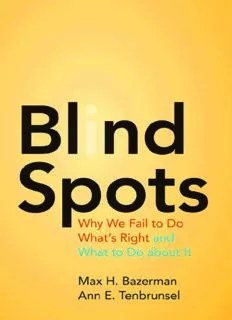
Blind Spots: Why We Fail to Do What's Right and What to Do about It PDF
Preview Blind Spots: Why We Fail to Do What's Right and What to Do about It
Blind Spots Bazerman.indb 1 12/21/2010 7:26:17 AM This page intentionally left blank Blind Spots Why We Fail to Do What’s Right and What to Do about It Max H. Bazerman Ann E. Tenbrunsel Princeton University Press Princeton and Oxford Bazerman.indb 3 12/21/2010 7:26:17 AM Copyright © 2011 by Princeton University Press Published by Princeton University Press, 41 William Street, Princeton, New Jersey 08540 In the United Kingdom: Princeton University Press, 6 Oxford Street, Woodstock, Oxfordshire OX20 1TW press.princeton.edu All Rights Reserved Library of Congress Cataloging-in-Publication Data Bazerman, Max H. Blind spots : why we fail to do what’s right and what to do about it / Max H. Bazerman, Ann E. Tenbrunsel. p. cm. Includes bibliographical references and index. ISBN 978-0-691-14750-5 (cloth : alk. paper) 1. Business ethics. 2. Corporate culture. 3. Decision making—Social aspects. I. Tenbrunsel, Ann E. II. Title. HF5387.B39 2011 174′.4—dc22 2010046640 British Library Cataloging-in-Publication Data is available This book has been composed in Scala and Avenir Printed on acid-free paper ∞ Printed in the United States of America 10 9 8 7 6 5 4 3 2 1 Bazerman.indb 4 12/21/2010 7:26:17 AM This book is dedicated to Dave Messick, whose ideas inspired us to study behavioral ethics, even before behavioral ethics had a name. Bazerman.indb 5 12/21/2010 7:26:17 AM This page intentionally left blank Contents Acknowledgments ix 1 The Gap between Intended and Actual Ethical Behavior 1 2 Why Traditional Approaches to Ethics Won’t Save You 24 3 When We Act against Our Own Ethical Values 38 4 Why You Aren’t as Ethical as You Think You Are 61 5 When We Ignore Unethical Behavior 77 6 Placing False Hope in the “Ethical Organization” 100 7 Why We Fail to Fix Our Corrupted Institutions 128 8 Narrowing the Gap: Interventions for Improving Ethical Behavior 152 Notes 173 Index 187 Bazerman.indb 7 12/21/2010 7:26:17 AM This page intentionally left blank Acknowledgments We have been working on this book for the last two decades—t hough we didn’t know this for much of the time. In 1991, Ann entered the doctoral program at Northwestern University’s Kellogg School of Management and spent much of her time there doing some of the early research that brought psychology into the realm of business ethics. Central to this work was Ann’s collaboration with David Messick, who arrived at about the same time, as the first Kaplan Distinguished Professor of Ethics at Kel- logg. Their work examined ethical fading, or the tendency for otherwise ethical people to make unethical decisions because the ethical implica- tions have faded from their decisions. Max connected with Ann and Dave on some of this research, but was largely an observer and fan of this work. In 2000, Max joined the Harvard University faculty and started con- ducting research with new colleagues Mahzarin Banaji and Dolly Chugh on what we called bounded ethicality, or the systematic ways in which people engage in unethical behavior without their own awareness. The ideas that resulted from this collaboration, together with those from Dave and Ann’s collaboration, proliferate throughout this book. At about the same time, Enron collapsed, and organizations and busi- ness schools were pushed to do something about the erosion of ethics in society. Consequently, the field of business ethics started to shift in ways that are described throughout our book. One core shift was the develop- ment of the field of behavioral ethics, which focuses on the psychology of how real people act in ethical contexts. Interest in behavioral ethics has grown exponentially over the past decade, and this burst of interest prompted us to combine our view of behavioral ethics in this book. Our work on ethics has been affected by our interactions and collabo- rations with many scholars. Some of these scholars include Modupe Akinola, Mahzarin Banaji, Iris Bohnet, Art Brief, Daylian Cain, Eugene Bazerman.indb 9 12/21/2010 7:26:18 AM
Description: